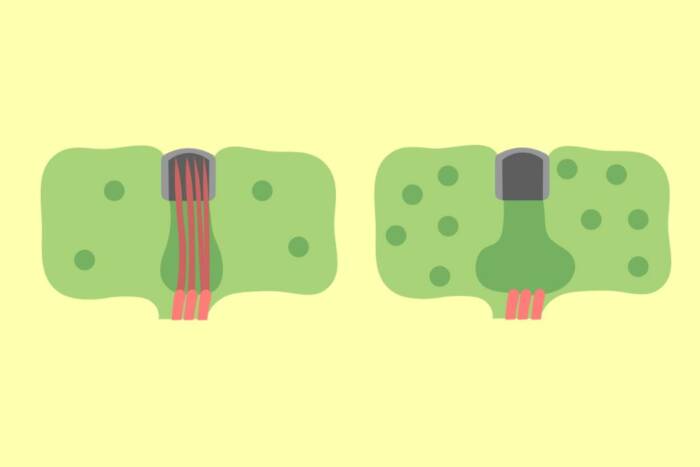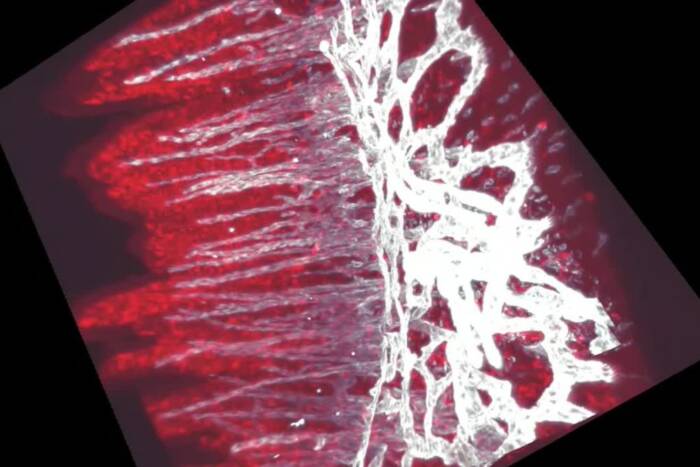Playing doctors: Tri-Institutional Music and Medicine Program features physicians and scientists who also perform music
by LESLIE CHURCH
Maybe it’s the fact that they both involve a good amount of discipline, or maybe it’s that each requires a certain flair for creative thought. Whatever the reason, many people find themselves drawn to both music and science, and are often faced with the difficult decision of choosing between two passions. The Music and Medicine program at Weill Cornell Medical College aims to make that choice easy for the students and faculty of Rockefeller, Cornell and Memorial Sloan Kettering — they can have both.

Strings theory. Stefanie Gerstberger (left, at center) and Johannes Scheid (right) at a 2012 concert at St. Bartholomew’s Church. Gerstberger and Scheid are among a handful of Rockefeller scientists lending their musical talents to the Tri-Institutional Music and Medicine Program
The program serves as a means for members of the Tri-Institutional community to play together for patients at NewYork-Presbyterian Hospital and audiences around the city. Founded in 2009, they have performed for audiences large and small, often in Rockefeller’s Caspary Auditorium. Groups also play mini-concerts for patients in palliative care, cancer survivors at the Weill Cornell Cancer Center and others. Their fall concert this year is November 25.
“The idea started in my office, interviewing medical school applicants,” says David A. Shapiro, clinical professor of psychiatry at Weill Cornell and chairman of the program. “Twenty percent of these students play a musical instrument, and we realized we could give them an outlet to continue that while in school, because it’s an important part of who they are.”
Run by Weill Cornell medical students and Nancy Amigron, program coordinator for the college’s Center for the Performing Artist, the group has had more than 100 members participate in various shows. Those who are interested sign up for a mailing list that sends out requests for musicians at certain events. Groups are organized and given music and rehearsal time. All are welcome — scientists, doctors, nurses, administrative staff, even relatives and friends — and musical abilities vary widely.
“The program gives all members of the Tri-Institutional community an opportunity to exercise and enhance their musical skills, while at the same time enriching us all with uplifting and beautiful music,” says Barry Coller, physician in chief of Rockefeller’s hospital and a member of the program’s advisory board. “That is a great combination.”
“We went caroling at the hospital during the holidays. We played for patients on Valentine’s Day,” says Stefanie Gerstberger, a graduate student in Thomas Tuschl’s lab who has been playing the violin since she was six. “Playing at the hospital really gave me a new perspective on music. You think it’s not a big deal, but the patients were just so happy. It was very special for them.”
For the Rockefeller researchers who take part, it’s a chance to break away from the bench and let another part of the brain take over.
“When you play an instrument you can’t do it halfway. It draws your entire body, your mind; it takes up all of your attention,” says Johannes Scheid, a member of Michel Nussenzweig’s laboratory who holds a diploma in cello from The University of Arts, Berlin. “In a short period of time you’re able to gain some distance from your scientific work. When you go back, you find yourself inspired. You have a new perspective.”
Dr. Scheid, a physician-scientist in Rockefeller’s Clinical Scholars Program, mused on the many correlations between science and art. Aside from the fact that both have the power to heal, and both require people to work together as a team, he says, the two are always evolving.
“Mozart’s Requiem was written hundreds of years ago, but people are still coming up with new interpretations, and there will never be a perfect one. It is similar with medicine and science. Each door you open leads to 10 more doors,” he says. “A certain group of people are attracted by that. It’s a moving target, drawing you in.”


